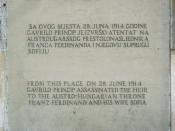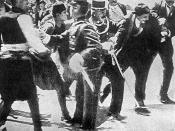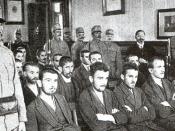The event that triggered the outbreak of World War I was the assassination of Archduke Ferdinand in 1914 (Baldwin, 1962). He was heir to the Hapsburg or Austro-Hungarian Empire until his untimely death at the hands of a Serbian nationalist by the name of Gavrilo Princip. However, prior to his assassination, a number of political events took place between 1870 and 1914 that have been considered by historians to be major factors in the outbreak of World War 1(Baldwin, 1962). These include, the growth of nationalism, the growth of imperialism, the massive build up armies and weapons and lastly the formation of strategic alliances between countries (Burg and Purcell, 1998).
In the 1800s countries such as Italy and Germany were fragmented into small kingdoms that were separately ruled. In this way the balance of power was maintained and one nation was not able to dominate or threaten another. Prior to the outbreak of war a wave of nationalism swept across Europe and with it came the belief that loyalty to one's country and its economic and political goals was far more important than the citizens and goals of any other country (Baldwin, 1962).
The goal of the nationalists was to unite people who shared a common language and culture under a single government. The nationalists prevailed; one of the most famous Italian nationalists was Garibaldi who formed the "Red Shirts" a unit who defeated all opponents of unification (Electronic article, a). Germany was also fragmented and was mainly unified by the Prime Minister of Prussia Otto von Bismarck. He had a policy of "Realpolitik" or real politics that really meant any sacrifice was appropriate to achieve unification. By 1871, Bismarck was successful and he placed Kaiser Wilhelm on the throne of a unified Germany (Baldwin, 1962).
As many countries unified...



World War I
This is much better than your previous essay of the same title. I suggest you change the title of one of the two essays to prevent any possible confusion. For example, you may want to call this essay: "World War I Causes and Aftermath." You indicate sources within the essay itself, but it would be helpful to also include a complete listing of references at the end of your essay.
4 out of 4 people found this comment useful.